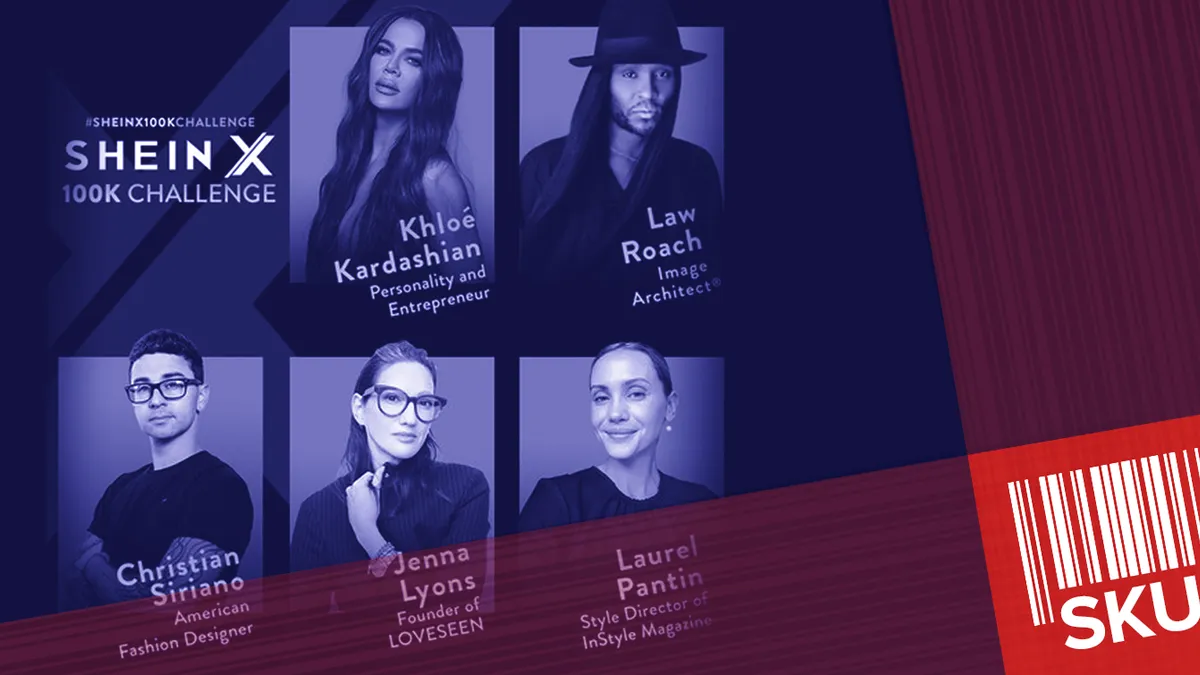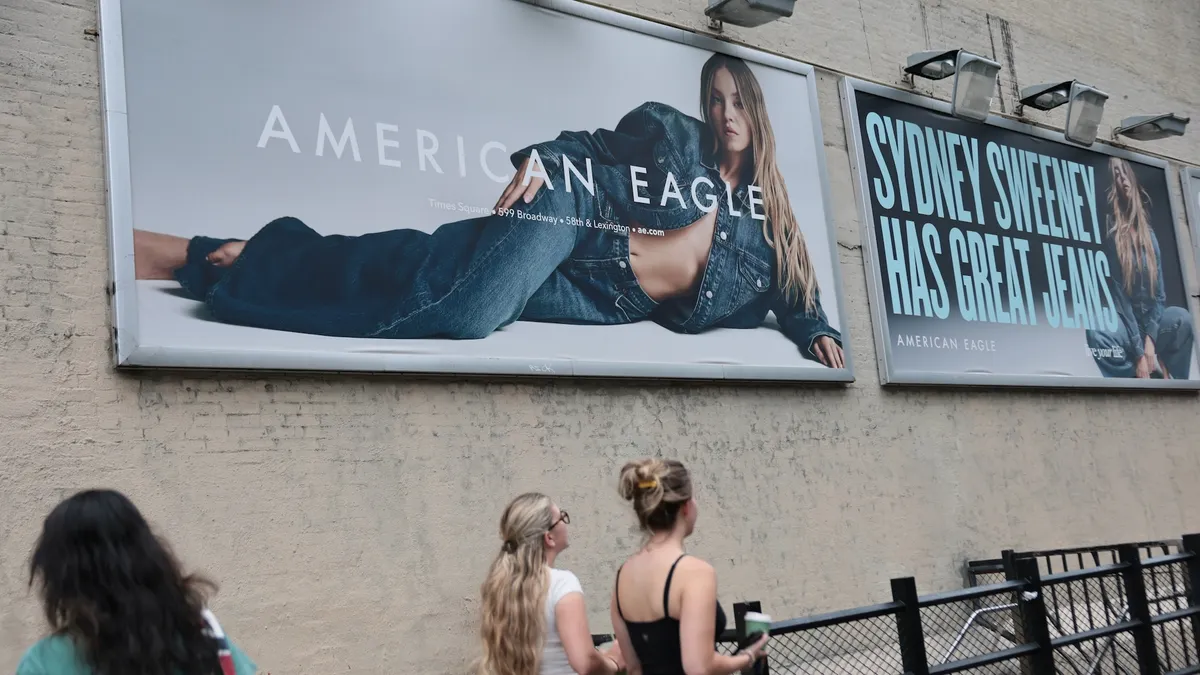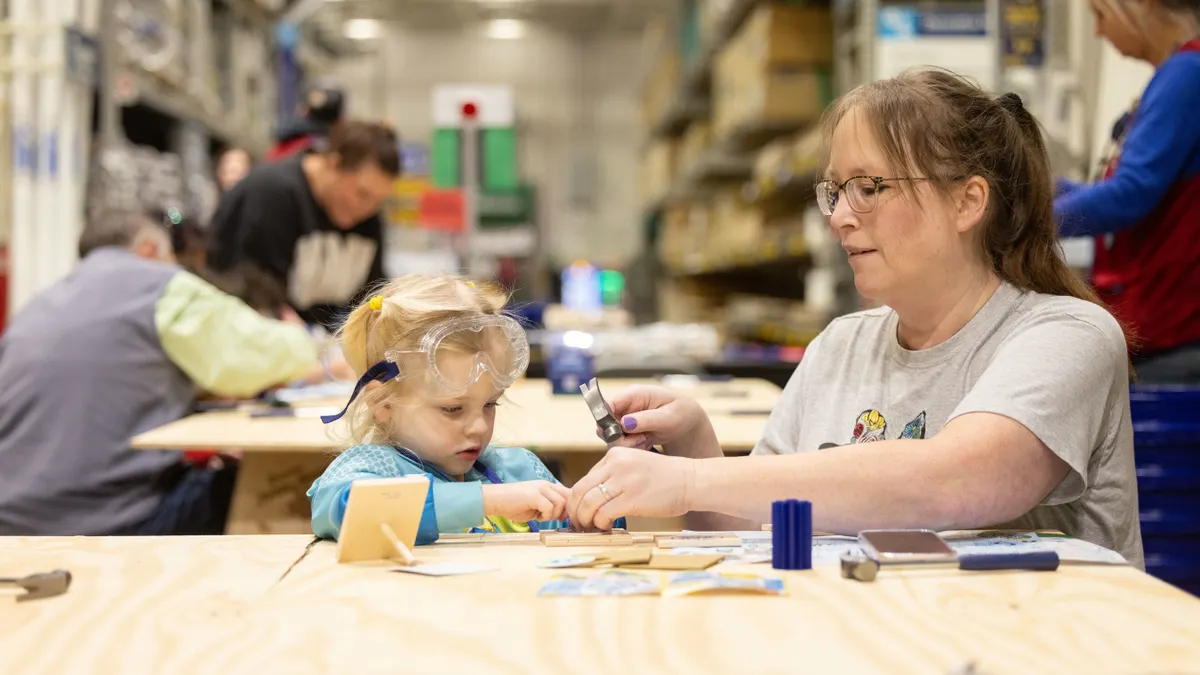Kaarin Vembar is obsessed with the luxury and apparel markets. She also has a sassy mouth so her managing editor decided to give her a column in an attempt to harness insight for readers. Kaarin can be reached at [email protected].
Pretend for a moment that you are an apparel company that brought in around $10 billion in 2020. You make up 28% of fast fashion sales in the United States. You are huge on TikTok, add 1,000 new styles a day, and currently have more app downloads in the U.S. than Amazon.
But, there are murmurs of problems. One of the most pressing is allegations that your company copies some of its designs from indie fashion labels. And it's happened not once, but a number of times.
So what do you do? Hold a contest to find the next top fashion designer, of course!
That's the direction Shein decided to go with its Shein X 100K Challenge. A group of 30 emerging up-and-coming designers competed for a chance to make it to become one of five finalists as part of a four-episode series that started Aug. 22 and runs through Sept. 12. Those finalists were then flown to Los Angeles. The contestants work one-on-one with judges and the winner receives $100,000 and will have their collection featured as part of Shein's Fall/Winter 2021 virtual fashion show.
The biggest surprise of this entire setup is the judges that Shein managed to pull in. They went after — and obtained — some of the biggest names in fashion and pop culture including Khloé Kardashian, designer Christian Siriano, InStyle style director Laurel Pantin, stylist Law Roach, and Jenna Lyons of Loveseen and J. Crew fame.
But then something happened. Many people in the fashion community came back with questions and a few words for both Shein and the judges on why they were participating in the contest.
In a post about the contest on Instagram, Lyons disabled comments.
"Listen — there are a lot of comments about SHEIN and I appreciate the feedback and everyone getting a chance to say how they feel," she wrote. "The reason I participated … is because the ENTIRE PROCESS was designed to support young designers, and all of the contestants were incredibly talented, passionate, and deserving of a chance at winning 100k." Lyons then went on to encourage people to not jump to conclusions, express their feelings on their own private Instagram accounts, and then read "The Man in the Arena" by Teddy Roosevelt. Because there is a huge overlap between fashion and Roosevelt stans.
(No seriously — our guy Roosevelt was a bit of a trendsetter and helped popularize the Panama Hat after visiting the construction of the Panama Canal in the early 1900s. That's right. There's a HISTORY LESSON mid-article!)
Kardashian has left up comments following her Instagram post about the contest. She received over 6,000 of them, many of them in the vein of one follower who said, "Shein steals from small creators" and another that said, "Fast fashion is not sustainable. Disappointed at the news you're advocating this." SheinOfficial, on the other hand, cheerfully chimed in, "We love you! So excited to watch!"
Christian Siriano's page had fewer comments, but he said that, "We deleted negativity! Thank you."
Which, of course, is the exact dilemma. This is not unwarranted social media trolling. It's not about negative vibes. What is (largely) occurring is thoughtful criticism from people who are pointing out a problem. And the message back to the judges has primarily been, "What are you doing?"
Shein simply can't be ignored. The company is a force when it comes to trendy apparel. According to a recent survey by Coresight Research, about one-third of respondents who had purchased clothing and footwear in the past year said they bought from Shein.
And also according to Coresight, its business practices may widely get adopted by other retailers. That mostly has to do with its efficiency of supply chain and data collection. If a new product is getting "clicks, taps and sales" when it goes online an algorithm then expands the manufacturing quota and updates the supplier factory floor in real-time to have extra materials ordered. This means that Shein has vastly cut down the timeframe between product design to manufacturing from three weeks to about seven days.
Shein, therefore, is seen as highly efficient, responsive and adaptable. It also has tapped into the highly-prized Gen Z market. And, people seem to really love stylish, cheap clothes. Which, if you are on a budget and want to get as much bang for your trendy buck, makes sense.
It also comes with consequences, though, including the sheer environmental impact of putting out that many SKUs per day. The Environmental Protection Agency says that the main source of textiles in municipal solid waste is discarded clothing. Over 9 million tons of clothing and footwear ended up in a landfill in 2018.
"Shein lacks transparency about its production chain and has been accused of involvement in unethical practices, such as child labor and use of sweatshops," Coresight wrote in its report about Shein. The company "likely contributes huge waste arising from unsold garments that end up in a landfill … We think that Shein must take big steps forward in its sustainability and ethical practice initiatives to build consumer confidence."
And that brings us back to why the partnerships with Shein were baffling to many of the judges' followers. Siriano less than a year ago partnered with ThredUp. He created a sustainable badge that people put on to let others know that they are wearing secondhand apparel.
"[W]e created a logo that stands for the power of thrift," Siriano said at the time of the announcement. "The design is an infinite loop, representing circular fashion and a future where clothing is reused again and again."
In an interview with Us Magazine he also said that, "Sustainability is becoming more of a priority as people realize the impact our actions have on the planet."
Shein, on its website, lightly addresses its approach to sustainability. "By turning to sustainable practices and fabrics, we're doing our part in keeping the planet as pretty as can be."
The result feels like retail gaslighting. While the public asks questions, the message from the company and from judges is that the reality that we see unfolding isn't what is happening. That there is no reason to question Shein's fashion design competition. That pushing for accountability is succumbing to negativity.
Fashion is a hard business. It's hard to break into, it's hard to keep momentum going, it's hard to obtain financing. And it's true that putting a spotlight on undiscovered designers — especially from a large range of backgrounds — gives new life to the industry. Shein positioned the venture as philanthropic. But to this observer and others, it feels like a public relations move that is supposed to distract from hard questions about the company.
























